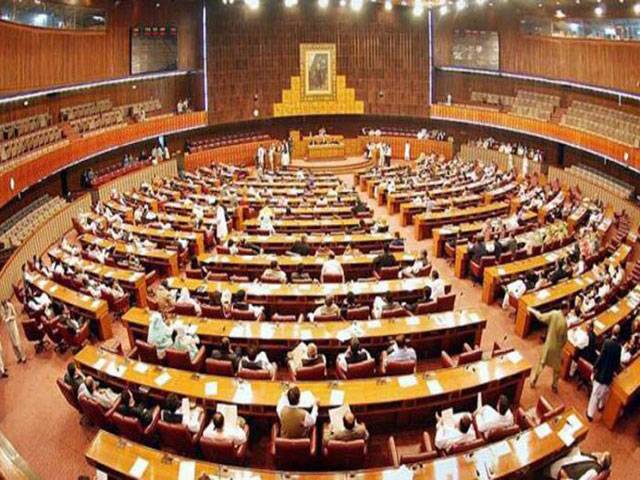ISLAMABAD - The National Assembly yesterday witnessed a clear division in the house over the bill related to ‘child marriage restraint’, not only between treasury and opposition but also in the members of ruling party (PTI).
The Child Marriage Restrain Amendment Bill (2019), passed from upper house of the parliament the other day (Monday), was referred to the standing committee concerned.
The difference of opinion in ranks of ruling party (PTI) ostensibly made the chair to conduct voting on the bill. Seventy-two lawmakers from different parties including PTI, PPP-P and PML-N supported the bill while 50 MNAs from PTI, religio-political parties (MMA) and others opposed it. The house echoed with the voice of ‘hurray’ when lawmakers in support of the bill managed to refer the bill to the parliamentary body concerned for discussion on it.
National Assembly sends bill to house standing committee after voting
The statement of objects and reasons of the bill says, “Unfortunately the practice of child marriage is common in all parts of Pakistan particularly in poor areas but the act of solemnising child marriage is not cognizable and police cannot take action against offenders. The amendment is intended to serve as deterrent and remove the existing gender disparity in age”.
It says, “In developing countries, leading cause of death for young girls between 15-18 years of age is early pregnancy. A child, as per the UN convention on right of the child, is any person under the age of 18”.
Poverty and illiteracy, according to the bill, are factors for prevalence of child marriage. Typically enormous pressure to bear children is put on child brides, it says.
The bill is prepared with the aims to curb the menace of child marriage prevalent in the country and save women from exploitation, underage marriage can lead to imprisonment of up to three years, a fine of at least Rs100,000 or both.
Minister of State for Parliamentary Affairs Ali Muhammad Khan with support of Minister for Religious Affairs and members of MMA opposed the bill. “There is need to get opinion of Ulema (Religious scholars)...This bill needs to be referred to Council of Islamic Ideology (CII),” said the minister, opposing her party members. Other members, opposing the bill, recommend to refer the bill in CII.
Whereas, Minister for Human Rights Shireen Mazari argued that same nature of bill had already been passed by the parliament of Egypt, Bangladesh and other countries. “One person can’t decide it, so it should be referred to standing committee concerned for debate,” said the minister. On private members day, ten bills were introduced in the house and two were rejected.
The voice to carve out new provinces was also raised mostly by the lawmakers from Hazra area. With lawmakers of the area PML-N’ Murtaza Javed Abbasi, mover of the bill, proposed to form separate province of Hazara on the requirement and wishes of the area.
Former deputy speaker Murtaza Javed Abbasi said there was a genuine need to create separate province in the area. The statement of object and reasons says, “The constitutional amendment bill seeks to meet their very genuine demands by restoring the provincial status of (Bahawalpur (comprising the existing administrative division of Bahawalpur) and creating the provinces of Hazara (comprising existing administrative division of Hazara) and Janubi Punjab (Comprising the existing administrative division of Dera Ghazi Khan).
MNA Mehnaz Akbar Aziz introduced ‘The Islamabad Capital Territory Prohibition of Corporal Punishment bill, 2019’ proposing to ban corporal punishment and declared it as offence.
MNA Kishwar Zehra with other MNAs introduced ‘the transplantation of human organs and tissues amendment bill (2019), proposing a provision to donate human organs in case of accidental death.
The statement of objects and reasons says, “most of human organs or tissues are still active even after clinical death and some of such human organs may be transplanted to persons in need,”.
Other bills including ‘the control of narcotic substances (amendment) 2019’, ‘The Provincial Motor Vehicles Bill, 2019’ and others were also introduced in the house.






